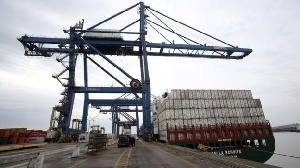One Global Standards (GS1) Ghana - a global firm that specialises in the development of bar codes to facilitate trade - has marked 10 years of operations in the country with a call on businesses to incorporate bar codes for their products to facilitate trade across borders.
Mr. Ekwow Spio-Garbrah, Minister for Trade, in a speech delivered on his behalf by Ibrahim Murtala Muhammed, the Deputy Minister for Trade said: “The use of bar codes has become very necessary for us in Ghana in view of the technical and non-technical barriers to trade; such as the use of electronic technologies to facilitate trade, which can either deny entry to export markets or make goods from developing countries less competitive in the global market.
“The increasing competition amongst developing countries for export markets means that buyers are able to insist on the application of quality standards as a condition for entry into the market. This trend has the potential to marginalise many developing countries. To avert this, developing countries must be able to integrate into the global economy by producing and selling goods in accordance with global standards.”
The importance of the bar code technology notwithstanding, some small and medium scale enterprises (SMEs) neglect using the technology.
“Unfortunately, statistics will show that our SMEs which form the bulk of business in Ghana neglect to apply bar code technologies to their products due to ignorance. They therefore do this at their peril, since it may result in marginalisation of their performance in the global market,” he said.
He stated that the Trade Ministry is concerned with supporting exporters by helping them to overcome technical barriers to trade.
“It is therefore important to stress the point that bar codes are a complement to the existing general labelling laws in this country. In order to supply food products to major international markets, businesses must comply with these food safety and traceability standards, requiring the implementation of complex informational systems and electronic data-capturing technology.
“Additionally GS1 empowers organisations to grow efficiently, sustainably and safely; helping transform the way we work and live. GS1 standards enable organisations to identify, capture, and share information smoothly; creating a common language that underpins systems and processes all over the world.”
GS1 standards provide a framework for real-time tracking, traceability and supply chain optimisation, GS1 is helping to revolutionise healthcare services. That is why the Institute of Packaging, Ghana, has been licenced by GS1 to educate, register, and issue barcodes to exporters in order to meet the ever-increasing demand of global trade,” he added.
Johnson Opoku-Boateng, CEO-GS1 Ghana said: “The introduction of the bar code by GSI Ghana has been a much-needed development for the nation. This is because the bar code gives information about the product, its delivery, and transport. GS1 tools help companies exchange critical data from manufacturing to the final consumer”.
He stated that GS1 Ghana is planning to implement more products apart from the bar codes. “We want to help in the transport and healthcare standards, because these are key standards that will help businesses to grow,” he said.
Maxwell Osei-Kusi, Director, Research, and Information GEPA, in his presentation stated that an EU regulation (178/2002) states that fresh fruit and horticulture also require bar codes. He stated that with implementation of the bar codes agencies will be able to ensure traceability.
Business News of Monday, 20 June 2016
Source: B&FT
GS1 marks 10th anniversary
Opinions











